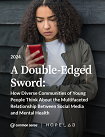
electronic resource
|
A double-edged sword : how diverse communities of young people think about the multifaceted relationship between social media and mental health
Copies
0 Total copies, 0 Copies are in,
0 Copies are out.







